| ||||||||||||||||||||||||||||||||||||||||||||||||||||||||||||||||||||||||||||||||||||||||||||||||||||||||||||||||||||||||||||||||||||||||||||||||||||||||||||||||||||||||||||||||||||||||||||||||||||||||||||||||||||||||||||||||||||||||
|
November 5, 2007 THE PRESIDENT: Good morning. Laura and I are thrilled to welcome you to the White House. We welcome the members of Congress, the members of the Cabinet, and other distinguished1 guests. It's an honor to be with the Medal of Freedom recipients2, as well as their family members and friends. We're sure glad you're here.
Our first honoree, Dr. Gary Becker, once said, "Many intellectuals, many economists5, use obscure language when they write. Sometimes it's a way of disguising that they are not saying a heck of a lot." This economist4, however, is different. Gary Becker's many books and articles, and his 19 years as a weekly columnist6, have provided -- proved him to be a thinker of originality7 and clarity. Dr. Becker has shown that economic principles do not just exist in theory. Instead they help to explain human behavior in fields well beyond economics. He has shown that by applying these principles to public policy, we can make great strides in promoting enterprise and public safety, protecting the environment, improving public schools, and strengthening the family. Dr. Becker has explained, as well, the real value of investing in human capital -- he knows full well that an educated and well-trained workforce8 adds to the vigors of our economy, and helps raise the standard of living for all of us. This longtime professor at the University of Chicago has helped train hundreds of talented economists. He has been a wise and challenging presence in the lives of his students, and they remain devoted9 to him. One close friend said, "A 15-minute conversation with Gary Becker can change your thinking forever." He is without question one of the most influential10 economists of the last hundred years. With today's honor, he is one of only two persons to have received both the Nobel Prize in Economics and the Medal of Freedom. The other was the late Milton Friedman. And I know that today Dr. Friedman would be very proud of his friend, and student, and colleague, Dr. Gary Becker. Congratulations. (Applause.)
Oscar Biscet is a healer -- known to 11 million Cubans as a physician, a community organizer, and an advocate for human rights. For two decades, he has told the world what he has seen in Cuba: the arrogance11 of a one-party state; the suppression of political dissent12; the coercion13 of expectant mothers. For speaking the truth Dr. Biscet has endured repeated harassment14, beatings, and detentions15. The international community agrees that Dr. Biscet's imprisonment16 is unjust, yet the regime has refused every call for his release. To the Cuban dictatorship, Dr. Biscet is a "dangerous man." He is dangerous in the same way that Martin Luther King, Jr. and Gandhi were dangerous. He is a man of peace, a man of truth, and a man of faith. In captivity17 for most of the last eight years, he has continued to embody18 courage and dignity. His example is a rebuke19 to the tyrants20 and secret police of a regime whose day is passing. Dr. Biscet is also a young man. God willing, he'll soon regain21 his freedom, as justice demands. He deserves to be reunited with his wife, Elsa, and all their family. And the land they call home deserves to be free. When that day arrives, the peoples of Cuba and the United States will stand together as free men and women. And the liberated22 country will honor a great man with a mighty23 heart, Oscar Elias Biscet. (Applause.) When tyrannies fall, it's often the prisoners and exiles who are called forth24 to lead their people. We've seen this in our own time, in the lives of President Havel, and President Mandela, and Prime Minister Maliki, and in the Republic of Liberia, President Ellen Johnson Sirleaf. All of her life, President Sirleaf has been a pioneer. The daughter of a school teacher in Monrovia, she crossed the ocean as a young woman and earned three degrees in the United States. She has been a business executive, a development expert, a public official -- and always a patriot25. She loves Liberia and she loves all its people. After a cabal26 seized power and plunged27 that country into years of upheaval28, and corruption29, and civil war, Ellen Johnson Sirleaf stood up for the democratic rights of her fellow citizens. She never wavered, even though the consequences were house arrest, foreign exile, death threats, and imprisonment.
The President has the tough mind of a natural-born executive, and the gentle instincts of a mother. Not surprisingly, the Liberian people have given her two affectionate nicknames. They call her the "Iron Lady," and they call her "Ma." She's begun an age of reform in a country with deep historic ties to the United States. As she said to a joint meeting of our Congress, "Liberia will become a brilliant beacon, an example to Africa and to the world of what the love of liberty can achieve." Madam President, America is proud to stand with Liberia. And today, America honors you as a woman of courage, and a giver of hope. Welcome back to the White House, my friend, and congratulations. (Applause.) Seventeen years ago, the federal government established a research project with the ambitious goal of mapping the entire human genome. The genome is best described as the code of life -- the "3.1 billion-letter instruction book that conveys all kinds of information and all kinds of mystery about humankind." Those were the words of Dr. Francis Collins, director of the National Human Genome Research Institute -- and the man who led the federal project to full and thrilling success. Many discoveries yet to be made, and many scientific triumphs yet to be achieved, will be directly traceable to the work of the human genome project. With genetic mapping, researchers know more than ever before about the hereditary influences behind cancer, and heart disease, and diabetes, and many other conditions. And that understanding holds the key to earlier detection of illness, individualized treatments, and even life-saving cures.
From his days being home-schooled by his Mom on a farm in Virginia, Francis Collins has been relentless in the pursuit of knowledge. He said, "One of the strongest motivations of humankind is to seek answers to profound questions i and [to understand] what is both seen and unseen." He has brought his extraordinary gifts to bear on the technical questions of genetics, and on the ethical questions, as well. Deep scientific understanding can be used for good or ill -- and a lot turns on knowing the difference. Francis Collins is unafraid of the eternal questions, unswayed by fashion, and unwilling to overlook the distinction between right and wrong. Dr. Collins has often noted that, "At the DNA level, we're all 99.9 percent the same. All of us." It's a reminder that the human genome project, with all the promise it holds for tomorrow, also confirms scientifically the timeless wisdom of the brotherhood of man. Americans are rightly proud this project succeeded in our own country. And we are proud of the wise and humane American scientist behind it -- Francis Collins. (Applause.) Brotherhood is perhaps the greatest theme in the life and character of Dr. Benjamin Hooks. The man has always had what his friend Dr. King called the strength to love. As a civil rights activist, public servant, and minister of the Gospel, Dr. Hooks has extended the hand of fellowship throughout his years. It was not an always thing -- easy thing to do. But it was always the right thing to do. Benjamin Hooks grew up in a segregated South, where economic advantages, and even common courtesies, were often denied to African Americans. In the Army during World War II, he guarded European prisoners of war held in the United States. When it was time to get something to eat, whites-only restaurants would serve the prisoners, but not Sergeant Hooks. After the war he wanted to study law, but not a single law school in Tennessee would admit a black man. So he went to DePaul University in Chicago, then came back home, determined to "break down that segregation, to end those days."
The nation best remembers Benjamin Hooks as the leader of the NAACP. For 15 years, Dr. Hooks was a calm yet forceful voice for fairness, opportunity, and personal responsibility. He never tired or faltered in demanding that our nation live up to its founding ideals of liberty and equality. His testimony had special power -- for the words that he spoke, and for the example that he set as a man of decency and rectitude. It's been a great journey, and he's traveled with a good and gracious woman at his side, Frances Hooks. They're a wonderful team. They've been married for 56 years. Dr. Hooks once said, "You've got to believe that tomorrow somehow can be, and will be, better than today." Because he had that belief, because he held on to it, because he acted upon it, an old order has passed away. And all Americans can be grateful for the good works and the good life of Benjamin L. Hooks. (Applause.) The story of an old order, and the glimmers of humanity that would one day overtake it, was unforgettably told in a book by Miss Harper Lee. Soon after its publication a reviewer said this: "A hundred pounds of sermons on tolerance, or an equal measure of invective deploring the lack of it, will weigh far less in the scale of enlightenment than a mere 18 ounces of a new fiction bearing the title To Kill a Mockingbird." Given her legendary stature as a novelist, you may be surprised to learn that Harper Lee, early in her career, was an airline reservation clerk. (Laughter.) Fortunately for all of us, she didn't stick to writing itineraries. (Laughter.) Her beautiful book, with its grateful prose and memorable characters, became one of the biggest-selling novels of the 20th century.
Years after To Kill a Mockingbird was put to film, the character of Atticus Finch was voted the greatest movie hero of all time. It won Gregory Peck the Oscar. He was said to believe the role "brought him closest to being the kind of man he aspired to be." The great actor counted Harper Lee among his good friends, and we're so pleased that Gregory Peck's wife, Veronique, is with us today. Thank you for coming. One reason To Kill a Mockingbird succeeded is the wise and kind heart of the author, which comes through on every page. This daughter of Monroeville, Alabama had something to say about honor, and tolerance, and, most of all, love -- and it still resonates. Last year Harper Lee received an honorary doctorate at Notre Dame. As the degree was presented, the graduating class rose as one, held up copies of her book, and cheered for the author they love. To Kill a Mockingbird has influenced the character of our country for the better. It's been a gift to the entire world. As a model of good writing and humane sensibility, this book will be read and studied forever. And so all of us are filled with admiration for a great American and a lovely lady named Harper Lee. (Applause.) Bob Hyde is here on behalf of his Dad, the Honorable Henry J. Hyde, who was not able to be with us today. Congressman Hyde spent more than three decades as a towering figure on Capitol Hill. But he first made his name in Washington more than 60 years ago. He was on the Georgetown basketball team, and played in the NCAA Eastern championship game in 1943. After college and Navy service in World War II, he returned home to Illinois, and earned a law degree, and made his way into politics. This erudite, scholarly man has walked with kings and kept the common touch. He won 20 elections, and gave steady service to the people of Illinois for 40 years.
He used his persuasive powers for noble causes. He stood for a strong and purposeful America -- confident in freedom's advance, and firm in freedom's defense. He stood for limited, accountable government, and the equality of every person before the law. He was a gallant champion of the weak and forgotten, and a fearless defender of life in all its seasons. Henry Hyde spoke of controversial matters with intellectual honesty and without rancor. He proved that a man can have firm convictions and be a favorite of Democrats and Republicans alike. Henry likes quoting the adage, "Make new friends, but keep the old; one is silver but the other is gold." To so many on Capitol Hill, Henry Hyde's friendship is gold. They're quick to say it's not the same Congress without him -- but that we're a better country because he was there. And colleagues will always admire and look up to the gentleman from Illinois, Henry J. Hyde. And, Bob, please tell your Dad a lot of us in Washington love him. (Applause.) For nearly 30 years, the proceedings of the House of Representatives have been televised -- unfiltered, uninterrupted, unedited, and live. For this we can thank the Cable-Satellite Public Affairs Network, or C-SPAN. And for C-SPAN, we can thank a visionary American named Brian Lamb. C-SPAN is not what you'd call exciting TV -- (laughter) -- though some of the call-in shows do have their moments. (Laughter.) It is, however, a tool that enlivens democracy, and informs and educates citizens of all ages -- at all hours. C-SPAN channels fill 17,000 broadcast hours a year. But you can watch for years and never hear anyone say the name Brian Lamb. Even Brian never says it. With his low-key manner, this native of Lafayette, Indiana likes to stick with substance. He's not there to provide commentary, or give much reaction either way. Yet vast numbers of Americans consider themselves fans of Brian Lamb. A writer from The Washington Post called it a "cult of non-personality." (Laughter.) The truth is, we've all seen him, and he's conducted some of the most fascinating interviews we have ever heard. As one C-SPAN watcher said, when you listen to Brian "You feel like he's just like you, only smarter." (Laughter.) Brian Lamb has spent most of his life in broadcasting, in a career that has taken many turns. The first program he ever hosted, back in the Midwest, was called "Dance Date," -- a side we haven't seen much of. (Laughter.) Brian Lamb is a Navy veteran; a former social aide here at the White House. In fact, when Brian was here a few months ago to interview a historian in the Lincoln Bedroom, the maitre d' of the residential staff of the White House remembered him from those days. The network Brian Lamb created has been called "scrupulously nonpartisan, [and] inherently patient." Committee hearings, and campaign events, and conferences, and rallies are shown from beginning to end, without editorial comment or interpretation. C-SPAN has no agenda, and only one assumption: that interested viewers are intelligent, and can make up their own minds about what they see and what they hear. An informed citizenry has been the strength of America since the days of the New England town hall. C-SPAN has revived the town-hall spirit for a modern, continental nation. For his enormous achievement and his personal modesty; for his high standards, and his contribution to our democracy, America is grateful to Mr. Brian Lamb. (Applause.) Now I call on the military aide to read the citations for the Presidential Medal of Freedom. MILITARY AIDE: Gary S. Becker. (Applause.) One of the world's great economists and premier intellectual innovators, Gary Becker has broadened the spectrum of economic life and social science. His pioneering analysis of the interaction between economics and such diverse topics as education, demography, and family organization has earned him worldwide respect and a Nobel Prize. His work has contributed to public policies and have helped improve the standard of living in developed and developing nations. The United States honors Gary Becker for his groundbreaking contributions to economics, which have helped us better comprehend the dynamic forces that drive our economy and shape our society. (Applause.) Yan Valdes, accepting on behalf of his father, Oscar Elias Biscet. (Applause.) Oscar Elias Biscet has dedicated his life to advancing human rights and democracy in Cuba. A medical doctor, he has been persecuted for his peaceful calls for a free Cuba. Despite being imprisoned for his beliefs, he remains a powerful advocate for a Cuba in which the rights of all people are respected. Freedom-loving people everywhere are his brothers and sisters, and his sacrifice benefits all mankind. The United States stands with Oscar Elias Biscet in his heroic struggle against tyranny, salutes him for his courage, and honors him for his devotion to freedom and human rights. (Applause.) Francis S. Collins. (Applause.) Francis Collins' work has revolutionized genetic research and deepened our understanding for human biology. Under his leadership, the Human Genome Project mapped and sequenced the full human genome. This monumental advance in scientific knowledge has begun to unlock some of the great mysteries of human life and has created the potential to develop treatments and cures for some of the most serious diseases. The United States honors Francis Collins for his efforts to decode human DNA and improve human health. (Applause.) Benjamin L. Hooks. (Applause.) As a minister, lawyer, judge, and public servant, Benjamin Hooks has dedicated his life to equal justice under law. A pioneer of the Civil Rights movement and a leader of the NAACP, he fought to extend the full promise of America to all its citizens, and he battled injustice with civility, grace, and a generous spirit. His efforts have helped bring our nation closer to its founding ideals. The United States honors Benjamin Hooks: champion of equality, opportunity, and justice. (Applause.) Robert Hyde, accepting on behalf of his father, Henry J. Hyde. (Applause.) A veteran, a lawyer, and a public servant, Henry Hyde has served his country with honor and dedication. During his 32-year career in the House of Representatives, he was a powerful defender of life, a leading advocate for a strong national defense, and an unwavering voice for liberty, democracy, and free enterprise around the world. A true gentleman of the House, he advanced his principles without rancor and earned the respect of friends and adversaries alike. The United States honors Henry Hyde for his distinguished record of service to America. (Applause.) Brian P. Lamb. (Applause.) As the driving force behind the creation of C-SPAN, Brian Lamb has elevated our public debate and helped open up our government to citizens across the nation. His dedication to a transparent political system and to the free flow of ideas has enriched our civic life. He has helped empower Americans to know and understand their government and hold it accountable. The United States honors Brian Lamb for his efforts to ensure that his fellow citizens are well-informed participants in the American system of self-government through reflection and choice. (Applause.) Harper Lee. (Applause.) Harper Lee's beautiful book is a meditation on family, human complexity, and some of the great themes of American life. At a critical moment in our history, To Kill a Mockingbird helped focus the nation on the turbulent struggle for equality. The novel became an instant American classic and earned her a Pulitzer Prize. Nearly half a century after its publication, her work continues to captivate new readers who encounter its compelling power for the first time. The United States honors Harper Lee for her outstanding contribution to the great literary tradition of America. (Applause.) President Ellen Johnson Sirleaf. (Applause.) As a Liberian Cabinet Minister, United Nations administrator, and Liberia's President, Ellen Johnson Sirleaf has been a force for democracy and opportunity. She has helped heal a country torn apart by over 14 years of conflict through perseverance, personal courage, and an unwavering commitment to build a more hopeful future for her homeland. The first woman elected president of an African nation, she has striven to improve the lives of people in her own country and across her continent. The United States honors Ellen Johnson Sirleaf for her dedication to freedom, democracy, and human dignity. (Applause.) THE PRESIDENT: Thank you all for coming. Laura and I now invite you to a reception here in the State Dining Room. I hope you've enjoyed this ceremony as much as I have. May God bless you all. Thank you. (Applause.) END 10:37 A.M. EST 点击  收听单词发音 收听单词发音
|
||||||||||||||||||||||||||||||||||||||||||||||||||||||||||||||||||||||||||||||||||||||||||||||||||||||||||||||||||||||||||||||||||||||||||||||||||||||||||||||||||||||||||||||||||||||||||||||||||||||||||||||||||||||||||||||||||||||||
- 发表评论
-
- 最新评论 进入详细评论页>>

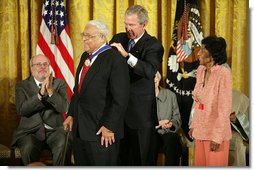 The Medal of Freedom is the highest civil honor that a President can
The Medal of Freedom is the highest civil honor that a President can 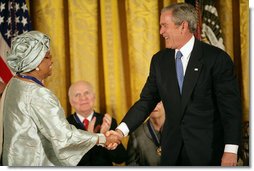 The Medal of Freedom for Oscar Elias Biscet will be accepted this morning by his son, Yan Valdes. His daughter, Winnie, is also present. Dr. Biscet is not with us today, because he is a political prisoner of the regime in Havana. This ceremony at the White House is being broadcast live into Cuba. To the citizens of that land, I send the respect and good wishes of the United States.
The Medal of Freedom for Oscar Elias Biscet will be accepted this morning by his son, Yan Valdes. His daughter, Winnie, is also present. Dr. Biscet is not with us today, because he is a political prisoner of the regime in Havana. This ceremony at the White House is being broadcast live into Cuba. To the citizens of that land, I send the respect and good wishes of the United States. 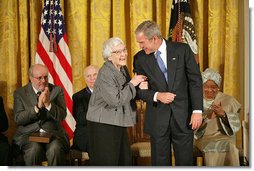 When free elections returned to Liberia, the voters made history. They chose her to be the first woman ever elected to lead a nation on the continent of Africa. She was inaugurated last year, with Laura and Secretary of State Condoleezza Rice as proud witnesses. I remember asking Laura and Condi what kind of person I'd be dealing with. They said to expect a woman of depth and ability who know how to get things done. They were right. See, when the President comes to the Oval Office, she walks in with a to-do list. (Laughter.)
When free elections returned to Liberia, the voters made history. They chose her to be the first woman ever elected to lead a nation on the continent of Africa. She was inaugurated last year, with Laura and Secretary of State Condoleezza Rice as proud witnesses. I remember asking Laura and Condi what kind of person I'd be dealing with. They said to expect a woman of depth and ability who know how to get things done. They were right. See, when the President comes to the Oval Office, she walks in with a to-do list. (Laughter.) 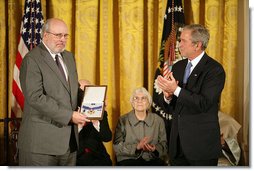 In scope and long-term potential, the human genome project has been compared to the Apollo project. And its leader, Dr. Collins, is a well-rounded man. Though he routinely works a 90-hour week, he is an accomplished singer and guitarist. (Laughter.) I know this because I once heard him at the National Prayer Breakfast. You see, when a man can get up and sing in front of 3,000 people at eight in the morning, there's something special in his DNA. (Laughter.)
In scope and long-term potential, the human genome project has been compared to the Apollo project. And its leader, Dr. Collins, is a well-rounded man. Though he routinely works a 90-hour week, he is an accomplished singer and guitarist. (Laughter.) I know this because I once heard him at the National Prayer Breakfast. You see, when a man can get up and sing in front of 3,000 people at eight in the morning, there's something special in his DNA. (Laughter.) 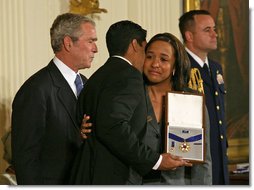 He became a lawyer, and in time was also an ordained Baptist minister. He joined the Southern Christian Leadership Conference, and was an early crusader in that great movement. He also rose in the legal profession, becoming the first African American ever to serve as a judge of the Tennessee Criminal Court. He was named to the Federal Communications Commission by President Nixon.
He became a lawyer, and in time was also an ordained Baptist minister. He joined the Southern Christian Leadership Conference, and was an early crusader in that great movement. He also rose in the legal profession, becoming the first African American ever to serve as a judge of the Tennessee Criminal Court. He was named to the Federal Communications Commission by President Nixon. 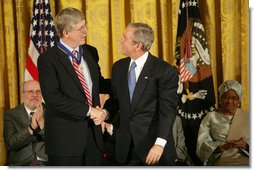 Forty-six years after winning the Pulitzer Prize, To Kill a Mockingbird still touches and inspires every reader. We're moved by the story of a man falsely accused -- with old prejudice massed against him, and an old sense of honor that rises to his defense. We learn that courage can be a solitary business. As the lawyer Atticus Finch tells his daughter, "before I can live with other folks I've got to live with myself. The one thing that doesn't abide by majority rule is a person's conscience."
Forty-six years after winning the Pulitzer Prize, To Kill a Mockingbird still touches and inspires every reader. We're moved by the story of a man falsely accused -- with old prejudice massed against him, and an old sense of honor that rises to his defense. We learn that courage can be a solitary business. As the lawyer Atticus Finch tells his daughter, "before I can live with other folks I've got to live with myself. The one thing that doesn't abide by majority rule is a person's conscience." 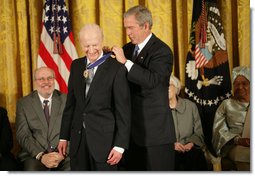 In the House, Congressman Hyde rose to the chairmanship of two committees, Judiciary and International Relations. And from the first day, he was a commanding presence, and he was a man of consequence. Colleagues were struck by his extraordinary intellect, his deep convictions, and eloquent voice. In committee and in the House chamber, the background noise would stop when Henry Hyde had the floor.
In the House, Congressman Hyde rose to the chairmanship of two committees, Judiciary and International Relations. And from the first day, he was a commanding presence, and he was a man of consequence. Colleagues were struck by his extraordinary intellect, his deep convictions, and eloquent voice. In committee and in the House chamber, the background noise would stop when Henry Hyde had the floor. 

